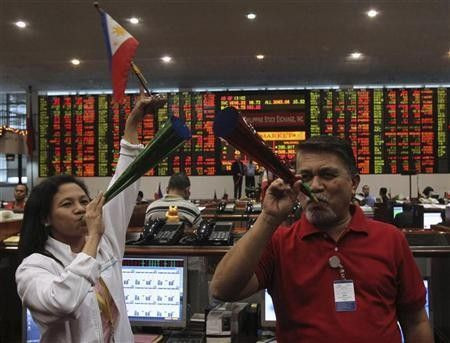Asian Markets Rise on Federal Reserve Rate Outlook

Equities, commodities and the euro extended gains Thursday after the U.S. Federal Reserve said it would keep interest rates low for a much longer-than-expected period, providing ample liquidity to help spur growth.
The prospect for unfavourable interest rate differentials undermined the dollar, pushing it to a five-week low against the euro as the U.S. central bank took the spotlight away from Europe's debt woes.
MSCI's broadest index of Asia-Pacific shares outside Japan rose to its highest in nearly 3 months and was up 1.1 percent, led by the materials and energy sectors as oil and gold extended their overnight rally.
Hong Kong shares, which resumed trading after a three-day Lunar New Year holiday, outperformed Asian peers on fresh buying in commodities-related stocks, rising 1.4 percent.
Financial spreadbetters expected Britain's FTSE 100, Germany's DAX and France's CAC-40 to open up around 0.4-0.6 percent.
Expectations for abundant liquidity available for a longer period of time supported markets across the assets, although the reaction was much stronger than anticipated, Yuji Saito, director of the foreign exchange division at Credit Agricole Bank in Tokyo.
The Fed also left the door open for a third round of quantitative easing to protect growth, and that, coming at this juncture, eased nervousness, he said.
Japan's Nikkei average bucked the trend and closed down 0.4 percent, slipping from a three-month high.
GOLD SHINES
Copper rose for a second day, while Brent crude topped $110 a barrel and U.S. crude rose above $100.
Commodities are seen as a hedge against any weakness in the currency markets, especially after Bernanke's statement last night, Jackson Wong, vice-president for equity sales at Tanrich Securities.
Gold climbed to a six-week high, adding to Wednesday's 2.5 percent gain to stay above $1,700 an ounce.
Bernanke's comments delivered the strongest message yet to highlight the fundamental factor supporting gold's rally over the past decade, which is that bullion's value is enhanced as a currency's value depreciates when lots of money is printed, said Yuichi Ikemizu, branch manager for Standard Bank in Tokyo.
The euro rose to a five-week high around $1.3127 on Thursday, while the yen stood at 77.61 yen, after hitting a two-month low near 78.29 yen on Wednesday. The dollar index, measured against key currencies, hovered near five-week lows below 80.
A prolonged period of super-easy monetary conditions is negative for the dollar, but the euro will remain pressured by the euro zone debt crisis and the market's focus will shift back to Europe, said Credit Agricole's Saito.
The Fed said on Wednesday it would keep interest rates near zero through at least 2014, which was longer than many investors anticipated. Fed Chairman Ben Bernanke said at a news conference the central bank was ready to offer the economy additional stimulus. The Fed also took the historic step of setting an inflation target.
Worries about Greece possibly facing a disorderly default persisted and curbed aggressive risk taking, but a report showing German business sentiment unexpectedly rose for the third month in a row in January eased concerns about Europe's largest economy falling into a recession.
This followed data showing resilience in euro zone manufacturing and services, also suggesting the region may avoid a recession.
The ample euro liquidity filtered through dollar funding markets, pushing the key interbank rate for dollars down further, away from around 30-months highs at the start of the year, while a gauge of dollar funding strains improved to levels not seen since August 2011 on Wednesday.
Improved cross-asset sentiment spilled over to the Asian credit markets, with spreads on the iTraxx Asia ex-Japan investment grade index narrowing by 3 basis points.
© Copyright Thomson Reuters {{Year}}. All rights reserved.





















